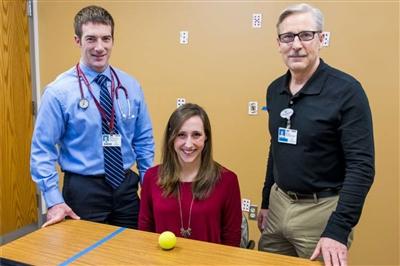Injury now 'just a bad dream' thanks to help of Bryn Mawr Rehab team
Kaylyn Sawyer had tried to take things one step at a time, but the symptoms were scary, and it felt like her life had veered off track. She had suffered a concussion in February 2015 after a slip and fall. Later that year, she sustained two more concussions after hitting her head on a fireplace mantel and then, a few weeks later, experiencing another fall.
After these incidents, Sawyer’s symptoms were severe. She had headaches and dizziness. Noise and light bothered her, but the worst part was her vision. Eye muscle spasms made Sawyer see double—images that were also blurry and in constant motion. The Gettysburg College junior could navigate her environment, but she couldn’t see details in objects and faces, and she couldn’t read. Sawyer had to medically withdraw for the fall semester of 2015. She consulted with specialists, who diagnosed post-concussion syndrome but offered no effective treatment for her vision problems. They said Sawyer would get better with time.
“I would spend almost every day in bed in a dark room trying to make the dizziness stop.”
Looking for answers
“It was hard,” Sawyer says. “Naturally, my family was worried. And as time passed and it kept getting worse, I thought, ‘What if this actually does stick around forever?’”
Sawyer’s mother, Cathy Satterfield of Yorktown, Virginia, was determined to find help for her daughter. Her research ultimately led her to the Neuro Center at Bryn Mawr Rehab Hospital, part of Main Line Health. There, a team of three rehabilitation experts worked together to turn the tide for Sawyer: optometrist Lynn Greenspan, OD, with Bryn Mawr Rehab Hospital Vision Clinic; physical medicine and rehabilitation physician Brian McDonald, DO, MPT, FAAPMR; and occupational therapist Clint Beckley, OTR/L.
Customized treatment plan

“With other concussion programs, there’s one therapist responsible for treating all the symptoms a patient experiences, such as problems with balance, vision, thinking, and memory. Our outpatient concussion therapy program has three components with dedicated specialists in each—physical therapy, occupational therapy, and speech therapy—so we can customize each patient’s program and give them the best chance for a full recovery,” Dr. McDonald explains.
Beckley’s task was to retrain Sawyer’s brain and eyes to work together.
“There was nothing mechanically wrong with her eyes,” he says. “The injury was in the brain. The concussion affected the cells in Kaylyn’s brain that are responsible for sending electric signals to the eyes to coordinate them.”
Beckley developed a series of visual scanning and tracking exercises for Sawyer.
Before her weekly sessions with him, Sawyer put in eye drops prescribed by Dr. Greenspan to calm her eye spasms so she could do her therapy.
Back to school—and life
The combined approach worked. Gradually, Sawyer’s eye muscle spasms dwindled, and her vision improved. Getting the right care, she says, was “life-changing.”
“My team at Bryn Mawr Rehab was able to give me back my vision and my life,” says Sawyer, 22. “I’ve returned to a normal life. I can read, I can drive … I can do anything.”
That includes graduating on time this May with her college class—something she thought was impossible last year.
“I cannot say enough good things about the care I received,” Sawyer says. “Everyone I worked with was supportive, understanding, and most of all, hopeful. Dr. McDonald, Dr. Greenspan, and Clint never made me feel like my situation would be permanent. They were constantly positive and encouraging. Dr. Greenspan told me that one day this injury would be just a bad dream, and she was right. Without the three of them, as well as my family, in my corner, I would not be where I am today.”
Concussion care at Bryn Mawr Rehab
As one of the first acute rehabilitation hospitals in the country to treat brain injuries, Bryn Mawr Rehab Hospital has been recognized as a leader in the field of concussion treatment and recovery for more than 30 years. Our team treats over 1000 concussion patients annually at our state-of-the-art Neuro Center at Bryn Mawr Rehab Hospital. Concussion patients come to us with routine to complex injuries, but leave with functional outcomes due in large part to the individualized, creative approach we bring to concussion care.
 Content you want, delivered to your inbox
Content you want, delivered to your inbox
Want to get the latest health and wellness articles delivered right to your inbox?
Subscribe to the Well Ahead Newsletter.
